Seeing these things for what they really are helps us to see the world for what it really is. To begin with, it may be helpful to look at how the Amplified Bible attempts to bring out the fuller meaning of the Greek words John uses in this verse: “For all that is in the world—the lust of the flesh [craving for sensual gratification] and the lust of the eyes [greedy longings of the mind] and the pride of life [assurance in one’s own resources or in the stability of earthly things]—these do not come from the Father but are from the world [itself].” John said (in 1 John 2:16): “For all that is in the world, the lust of the flesh, and the lust of the eyes, and the pride of life, is not of the Father, but is of the world.” What all is in and from the world? John offers three categories:
John said (in 1 John 2:16): “For all that is in the world, the lust of the flesh, and the lust of the eyes, and the pride of life, is not of the Father, but is of the world.” What all is in and from the world? John offers three categories:
Lusts of the Flesh Bible Scripture
The Amplified Bible explains the “lust of the flesh” as “cravings for sensual gratification.” The J.B. Phillips translation refers to it as: “Men’s primitive desires.” Based upon the apostle James principle in James 1:15: “Then when lust hath conceived, it bringeth forth sin: and sin, when it is finished, bringeth forth death.” I believe it is accurate to say that “the lusts of the flesh” correspond to “the deeds of the flesh” – that is, desires in the heart and mind result in sinful actions in the soul and body.
There is a partial list of the “deeds of the flesh” in Paul’s letter to the Galatians. See Galatians 5:19-21: “Now the works of the flesh are manifest, which are these; Adultery, fornication, uncleanness, lasciviousness, Idolatry, witchcraft, hatred, variance, emulations, wrath, strife, seditions, heresies, Envyings, murders, drunkenness, revellings, and such like: of the which I tell you before, as I have also told you in time past, that they which do such things shall not inherit the kingdom of God.”
From this list, we see that some lusts and deeds of the flesh are sins of self-indulgence – like the various types of sexual sin, drunkenness, drug abuse, and partying. Other lusts and deeds of the flesh are sins of self-exaltation – like hatred, strife, jealousy, anger, conflict, factions, and envy. And still, other lusts and deeds of the flesh are sins of self-preservation – like idolatry and selfish ambition.
Each one of these “deeds of the flesh” warrants further attention, but it is not within the scope of this message to go into further detail regarding each one individually. But suffice it to say that they fall into these three categories of self-indulgence, self-exaltation, and self-preservation. From this, we can see that “self” is a primary focus in the “elements of the world.” This self-centeredness is resident in the hearts of fallen human beings who fashion and propagate the culture of the world.
The Lusts of the Eyes
The Amplified Bible explains the “lust of the eyes” as “greedy longings of the mind.” Phillips translates it as: “their greedy ambitions.” This refers to the ungodly longing for things which we can see. Biblical wisdom literature tells us that the eyes are never satisfied. See Proverbs 27:20 and Ecclesiastes 1:8:
- Proverbs 27:20: “Hell and destruction are never full; so the eyes of man are never satisfied.”
- Ecclesiastes 1:8: “All things are full of labour; man cannot utter it: the eye is not satisfied with seeing, nor the ear filled with hearing.”
The word “covetousness” defines this condition. More modern terms would be “greed” and “materialism.” These terms speak of the tenor of our age – the culture of fallen humanity. But listen to the apostle Paul’s response in Colossians 3:5-7: “Mortify therefore your members which are upon the earth; fornication, uncleanness, inordinate affection, evil concupiscence, and covetousness, which is idolatry: For which things’ sake the wrath of God cometh on the children of disobedience: In the which ye also walked some time, when ye lived in them.”
See also Ephesians 5:5-7: “For this ye know, that no whoremonger, nor unclean person, nor covetous man, who is an idolater, hath any inheritance in the kingdom of Christ and of God. Let no man deceive you with vain words: for because of these things cometh the wrath of God upon the children of disobedience. Be not ye therefore partakers with them.”
The Boastful Pride of Life
The apostle John would also have us to be aware of “the pride of life.” The Phillips translation refers to it as: “the glamour of all they think splendid.” Most Bible translations render simply “pride of life”; but the New American Standard includes an aspect from the root of the Greek word by adding “boastful” to “pride of life.”
The word implies “self-confidence”, as well as confidence in earthly, material things, as the Amplified Bible brings out with the phrase, “assurance in one’s own resources or in the stability of earthly things.” What is being described here is putting confidence and trust in one’s personal gifts and talents, money and material possessions, and the accompanying social position and power.
Lord's Library participates in affiliate programs. We may make a small commission from products purchased through this resource.
- God’s Purpose in Trials: Why Does God Give Us Trials? - May 14, 2024
- Tribulation in the Bible Meaning by Jesus: Definition & Scriptures - May 10, 2024
- Good in the Bible Meaning by Jesus: Definition & Key Scriptures - October 2, 2023














